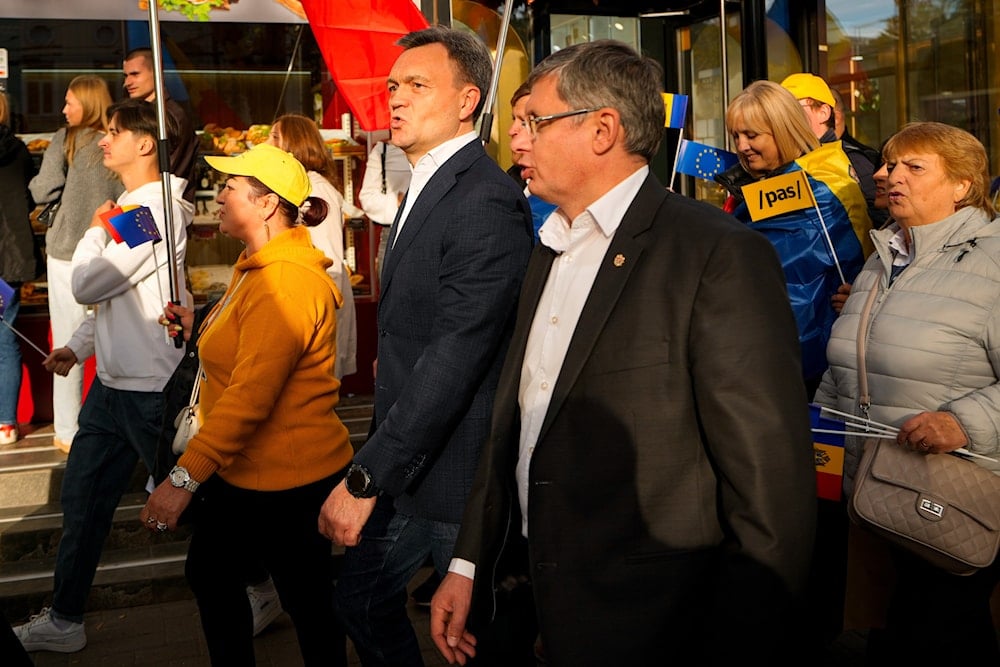Moldova Elections 2025: Key vote between EU path and ties with Russia
Moldova's 2025 parliamentary elections could reshape its future, as voters choose between EU integration and closer ties with Russia.
-

Moldova's Prime Minister Dorin Recean walks with Igor Grosu, the president of the ruling Party of Action and Solidarity, during a pro-EU rally of the ruling Party of Action and Solidarity (PAS), in Chisinau, Moldova, Friday, September 26, 2025 (AP)
Voting began Sunday in Moldova's parliamentary elections, which could pivot the country away from its pro-European path toward Moscow, with the government and EU alleging Russian interference and Russia doing the same.
Moldova is deeply divided between pursuing closer EU ties and maintaining relations with Moscow, and while polls show the ruling pro-EU party is leading, analysts warn the election's outcome is still uncertain. Voting began at 7 AM (0400 GMT) and will conclude at 9 PM, with results anticipated later the same day.
Moldova's President and former leader of the Party of Action and Stability Maia Sandu, has called the vote Moldova's most crucial election, claiming the choice is between advancing toward EU membership or being pulled by Russia into a destabilizing grey zone.
The European Union has claimed that Russia is running a disinformation campaign, while the Moldovan PM warned of a "siege" on Chisinau, allegations Moscow has denied.
This Sunday, Moldova heads into its most consequential election. Its outcome will decide whether we consolidate our democracy and join the EU, or whether Russia drags us back into a grey zone, making us a regional risk.
— Maia Sandu (@sandumaiamd) September 26, 2025
Moldova’s future must be decided by Moldovans, not Moscow.
Analysts say that voter turnout will be decisive, particularly in the large and powerful diaspora which tends to support PAS, as well as in the breakaway, pro-Russian region of Transnistria. The election features around 20 political parties and independent candidates vying for 101 parliamentary seats.
Dodon: Opposition will take majority
Igor Dodon, the former president and a leader of the pro-Russian opposition, expressed his conviction that the opposition would achieve a majority.
On foreign policy, he stated his intention to continue discussions with the EU while also re-establishing relations with the Russian Federation, accusing the current government of being a dictatorial regime that uses its EU alignment as a cover to violate democratic norms.
Although the ruling pro-European Party of Action and Solidarity (PAS), led by President Maia Sandu, has commanded a parliamentary majority since 2021, recent opinion polls suggest it could lose ground as opposition parties tap into public frustration over high living costs, rising poverty, and economic stagnation.
Analysts warn that a weakened PAS may be forced into coalition rule, potentially complicating its target of securing EU accession by 2030.
On September 27, officials confirmed that Moldova’s Central Electoral Commission had barred the pro-Russian political force, Greater Moldova, from contesting the parliamentary elections by citing evidence of illicit financing.
The decision, which was taken late on September 26 and marks the second time in just days that a pro-Russian party has been excluded, intensifies concerns over foreign influence, the integrity of the electoral process, and Moldova’s long-term EU aspirations.

 3 Min Read
3 Min Read









